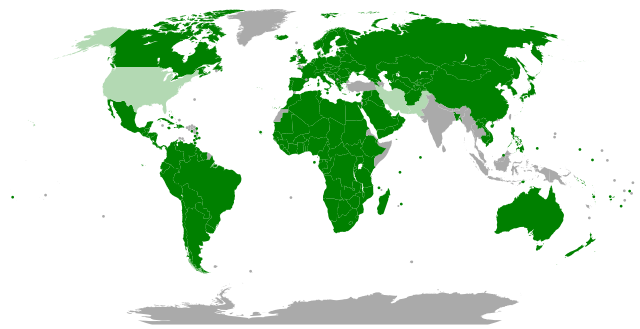1977 amendment protocol to the Geneva Convention From Wikipedia, the free encyclopedia
Protocol I (also Additional Protocol I and AP I)[4] is a 1977 amendment protocol to the Geneva Conventions concerning the protection of civilian victims of international war, including "armed conflicts in which peoples are fighting against colonial domination, alien occupation or racist regimes".[5] In practice, Additional Protocol I updated and reaffirmed the international laws of war stipulated in the Geneva Conventions of 1949 to accommodate developments of warfare since the Second World War (1937–1945).

Protocol I contains 102 articles. The following is a basic overview of the protocol.[6] In general, the protocol reaffirms the provisions of the original four Geneva Conventions. However, the following additional protections are added.
As of August 2024, it had been ratified by 174 states.[8] The United States, Iran, and Pakistan signed it on 12 December 1977 but never ratified it. Israel, India, and Turkey have not signed the treaty.
On 16 October 2019, President Vladimir Putin signed an executive order[9] and submitted a State Duma bill to revoke the statement accompanying Russia's ratification of the Protocol I, accepting the competence of the Article 90(2) International Fact-Finding Commission.[10][11][12] The bill was supplied with the following warning:[10][12]
Exceptional circumstances affect the interests of the Russian Federation and require urgent action. ... In the current international environment, the risks of abuse of the commission's powers for political purposes by unscrupulous states who act in bad faith have increased significantly.
Article 1(4) says:
The situations referred to in the preceding paragraph include armed conflicts in which peoples are fighting against colonial domination and alien occupation and against racist regimes in the exercise of their right of self-determination.
Jan Arno Hessbruegge, who works at the New York Office of the United Nations High Commissioner for Human Rights, examined the three categories listed in his book Human Rights and Personal Self-defense in International Law:[13]
Legal scholar Waldemar A. Solf opined that Article 1(4) was largely symbolic and gave party states "a plausible basis for denying its application to their situation", while the states which the article most applied to (e.g., Israel, and apartheid-era South Africa) would not sign the agreement at all.[14]
The Reagan administration declared that Article 1(4) would "grant terrorists a psychological and legal victory",[15] as it appears to grant combatant status to non-state actors, many of which (such as the Palestine Liberation Organization) have been designated as terrorist groups by the United States and other countries. By contrast, an article in the International Review of the Red Cross argues that this article, in fact, strengthens the fight against terrorism, by applying the laws of war (including all its prohibitions and obligations) to national wars of liberation. By granting combatant status to non-state actors in wars of liberation, it too requires non-state actors to follow the strict prohibitions against acts of terror (Article 13, Article 51(2), etc.).[16]
Seamless Wikipedia browsing. On steroids.